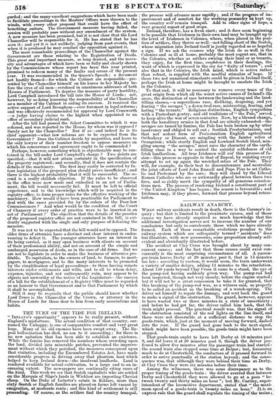THE URN OF THE TIDE FOR IRELAND.
"IRELAND'S opportunity" appears to be really present, without England's misfortune. The actual condition of that country, sur- named the Unhappy, is one of comparative comfort and very great hope. Many of its old enemies have been swept away. The Re- peal hallucination has died, no son to it succeeding ; for there is no new agitation that has been able to establish an existence. While the famine has removed the numbers whose crowding upon the land, divided into miserable patches, prevented the improve- ment without which they perished, the measures consequent upon that visitation, including the Encumbered Estates Act, have made considerable progress in. driving away that phantom host which helped to keep Ireland down—the insolvent landlords. Land is repdered available for actual cultivation, to a large and to an in- creasing extent. The newspapers are continually citing eases of the kind This week we see that Scotch capitalists who are settled on. the Marquis of Sligo's lands in Wicklow are importing Cheviot sheep. On. the Duke of Leinster's estate in Kildare, more than sixty Scotch or English families are placed on farms left vacant by emigration,, at moderate rents ; and this kind of settlement is still proceeding.- Of course, as the settlers find the- country tranquil, the process will advance more rapidly ; and if the progress of im- l.provement and of comfort for the working peasantry be kept up, I the country will remain tranquil. Add to other signs of hope, a very general report of good crops. Ireland, therefore, has a fresh start; and it does seem beginning ; to be possible that Irishmen in their own laud may be brought up to I the level of Irishmen in Colonies, where, when placed in the posi- tion of settlers, they thrive so well—not falling short of the Scotch, whose migration into Ireland itself is justly regarded as so- hopeful a sign. If we ask the reasons why the Irish do so well in the Colonies and so ill at home, probably the most cogent. are' that in the Colonies, whether as settlers owning their land or as tenants, they enjoy for the first time, confidence in their dealings, the want of which is expressed in the cry for. "fixity of tenure"; and ' also that in the Colonies, the Irish mind, which is active rather than robust, is supplied with the needful stimulus of hope. If those two not unnatural stimulants could be given in Ireland itself, perhaps the Irish at home might be brought to emulate the Irish in the Colonies.
To that end, it will be necessary to remove every trace of the great origin from which all the worst active causes of Ireland's ills , arose, the distinction of race between the landowning and the land- tilling classes,—a supercilious race, disliking, despising, and yet fearing " the savages "; a down-trod race, mistrusting, fearing, and hating " the tyrants." Religious diainjtions, English sympathies with a Protestant gentry, and old traditions of " the Pale," served. to keep alive the war of seven centuries. Now, by a blessed change, both the hereditary armies in that feud are utterly exhausted—the savages are tamed by famine, the Pale has been broken up by utter insolvency and obliged to sell out ; Scottish Presbyterianism, and that not ardent form of Protestantism English agricultural Orthodoxy or Dissent, are mingling with the fainter relics of Orangeism ; while sturdy English and Lowland Scotch blood, min- gling among " the savages," must raise the character of the earth- tilling class in a way to control the suicidal selfishness of old _ Irish landlordism. All true Irishmen will aid this process of fu- sion—this process so opposite to that of Repeal, by resisting every attempt to set up again the wretched relics of the Pale. They will, for example, do their best to discountenance and neutralize the joint efforts of Lord John Russell and Pope Pius to set Catho- lic and Protestant by the ears ; they will stand by the Liberal Roman Catholics who are so awkwardly placed between those two fires, and so richly merit the sympathy of all generous conscien- tious men. The process of rendering Ireland a constituent part of " the United Kingdom " has begun ; the season is favourable ; and Irishmen may, if they please, forward that process beyond retrac- tation.


























 Previous page
Previous page